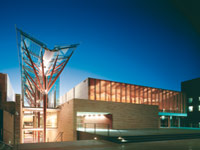Biomedical Engineering - 8660
Program Summary
Faculty: Faculty of Engineering
Contact: http://www.eng.unsw.edu.au
Campus: Kensington Campus
Career: Postgraduate
Typical Duration: 1.5 Years
Typical UOC Per Semester: 24
Min UOC Per Semester: 3
Max UOC Per Semester: 27
Min UOC For Award: 72
Award(s):
Master of Biomedical Engineering (Specialisation)
Information valid for students commencing 2013.
Students who commenced prior to 2013 should go to the Handbook's Previous Editions
Program Description
The MBiomedE degree program is designed to cater for students with either a medical/biological science or engineering/physical science background.
In the early part of the program, candidates with a medical/biological science background may study basic engineering courses such as mathematics, mechanics, electronics and computing. Candidates without a biomedical background may take courses in physiology and/or anatomy. All candidates then choose electives from the list below. The program also offers candidates scope for original research into the application of engineering principles and technology to health care delivery.
Period of candidature: The normal period is three academic semesters (full-time) or six academic semesters (part-time). The maximum period of candidature is six academic semesters (full-time) and twelve academic semesters (part-time). In special cases extensions may be granted.
Program Objectives and Graduate Attributes
Program Structure
The core biomedical engineering content may be selected from the following options:
Semester 1
- BIOM9311 Mass Transfer in Medicine (6 UOC)
- BIOM9332 Biocompatibility (6 UOC)
- BIOM9333 Cellular & Tissue Engineering (6 UOC)
- BIOM9510 Introductory Biomechanics (6 UOC)
- BIOM9551 Biomech of Physical Rehabili'n (6 UOC)
- BIOM9621 Biological Signal Analysis (6 UOC)
- BIOM9640 Biomedical instrumentation (6 UOC)
- BIOM9670 Advanced Bionics (6 UOC)
- BIOM9701 Dynamics of Cardiovascular Sys (6 UOC)
- BIOM9711 Modelling (6 UOC)
- BIOM9914 Masters Project (12 UOC)
- GSOE9712 Engineering Statistics (6 UOC)
- BIOM9027 Medical Imaging (6 UOC)
- BIOM9060 Biomedical Systems Analysis (6 UOC)
- BIOM9410 Regulatory Req of Biomed Tech (6 UOC)
- BIOM9420 Clinical Laboratory Science (6 UOC)
- BIOM9432 Introductory Polymer Chemistry (6 UOC)
- BIOM9450 Clinical Information Systems (6 UOC)
- BIOM9541 Mechanics of the Human Body (6 UOC)
- BIOM9561 Mech Properties of Biomaterial (6 UOC)
- BIOM9650 Biosensors and transducers (6 UOC)
- BIOM9660 Implantable Bionics (6 UOC)
- BIOM9914 Masters Project (12 UOC)
- GSOE9712 Engineering Statistics (6 UOC)
- For students with an engineering or physical sciences background ANAT2511 Fundamentals of Anatomy, PHSL2121 Principles of Physiology 1A and PHSL2221 Principles of Physiology 1B are highly recommended. (Not applicable to candidates in programs 8538 or 5445).
- BIOM9510 Introductory Biomechanics is for students with no mechanics background and is assumed knowledge for those taking BIOM9541 Mechanics of the Human Body and/or BIOM9551 Biomechanics of Physical Rehabilitation.
- The BIOM9914 Masters Project is offered, subject to school approval, and is usually taken in the final semester.
- Latest program and course information may be found at the Biomedical Engineering website http://www.gsbme.unsw.edu.au
Academic Rules
Fees
Area(s) of Specialisation









